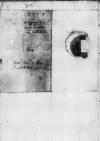Letter #198
Bona Sforza to Ioannes DANTISCUSCracow, 1524-05-03
| received Bari, [1524]-06-03 Manuscript sources:
| ||||||
Text & apparatus & commentaryPlain textText & commentaryText & apparatus
Magnifico paper damaged⌈[Magnifico]Magnifico paper damaged⌉ et egregio viro [...] paper damaged⌈[...][...] paper damaged⌉ nuntio et oratori [...] paper damaged⌈[...][...] paper damaged⌉ nostro sincere dilecto
Magnifice et egregie vir sincere nobis dilecte.
Non miretur S(trenui)tas or S(inceri)tas⌈S(trenui)tasS(trenui)tas or S(inceri)tas⌉ Tua
[...] paper damaged⌈[...][...] paper damaged⌉ eidem scripsimus. Commisimus enim magnifico
Quae bene valeat.
Dat(ae) or Dat(um)⌈Dat(ae)Dat(ae) or Dat(um)⌉


 BCz, 3465, p. 116
BCz, 3465, p. 116